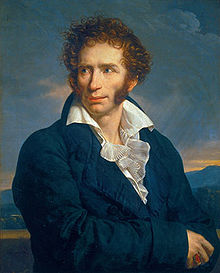- Dei sepolcri
-
Dei sepolcri is a poem written by the Italian poet, Ugo Foscolo in 1806 and published in 1807. It consists of 295 hendecasyllabic verses. The carme (as the author defined it) is dedicated to another poet, Ippolito Pindemonte, with whom Foscolo had been discussing the recent Napoleonic law regarding tombs.
Foscolo has materialistic views about man's destiny after death, but he strongly affirms the value of tombs as memory of noble souls or bright intellects.
Political and Cultural Background
The idea behind the poem can be traced back to 1804, when the Napoleon edict of Saint-Cloud was issued. On September 5, 1806 the edict was applied to Italy. In short, the edict stated that all burials must take place outside the city walls, that (for democratic reasons) the burial monuments must all be of the same size, and their inscriptions controlled by a special commission. This caused Foscolo to contemplate upon the nature and philosophy of death.
Being an atheist, Foscolo did not share the view of e.g fellow poet Ippolito Pindemonte, who defended the Christian cult as opposed to the new "illuminist" ideas brought on by the French regime. Even so, Foscolo was critical towards the Napoleonic decree regarding tombs, mostly for "civic" reasons: Even though he affirms that there is no life after death, human beings will still aspire to "transcend" death. Tombs, regarded as monument over fallen heroes and virtuous men from the past, may inspire those living today- for instance artists and poets. When marble monuments are destroyed by time, their memories survive in poems they have inspired, and can in turn inspire deep virtues in new generations.
References
- Opere di Ugo Foscolo, a cura di Mario Puppo, Ugo Mursia editore, Milano 1962.
- Storia della Letteratura Italiana; direttori: Emilio Cecchi e Natalino Sapegno, vol. 7. L'Ottocento. ed. Garzanti, Milano, 1969.

This article related to a poem is a stub. You can help Wikipedia by expanding it.

